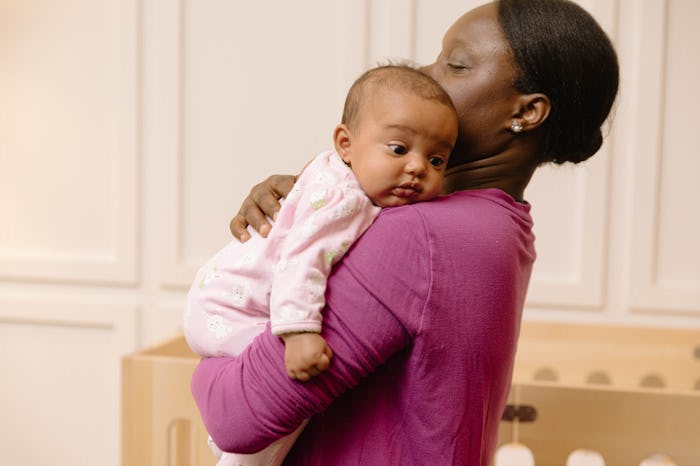Everyone's been there — baby stops crying as soon you pick them up, and starts as soon as you put them back down. It's an equally frustrating and endearing phenomenon, and maybe you're curious as to why your baby stops crying when you carry and bounce them. As it turns out, this isn't unique to human infants, and the reason why it occurs is as evolutionary as it gets.
According to Psychology Today, all mammalian infants, from humans to mice, experience an automatic calming reaction when carried, especially by their mothers. In fact, it's neurobiological for infants to stop crying when carried, and it's an evolutionary trait that helps species survive.
A study published in Current Biology explained the calming response as a combination of central, motor, and cardiac regulations. It's considered to be a trait preserved by evolution, as infants immediately become calm and relaxed when held, and this leads to a lowered and healthy heart rate in those babies.
So why do babies need so much calming and relaxation? According to the website for Dr. Sears, these sorts of biorhythms in babies' systems are naturally organized in the womb during pregnancy, and they become temporarily disorganized by birth. Carrying and babywearing is another form of extending the womb experience, allowing baby some time to re-organize those systems and adjust to life outside of the womb.
As the American Pregnancy Association noted, babies are soothed by soft movements because it mimics their life in the womb. They are used to continuously being carried and on the move, and for some babies, the shock of life outside of the womb can be jarring, which is why bouncing can calm babies down so well.
In fact, being carried has many developmental benefits to babies — they often sleep better, manage stress better, and have better autonomic functions, TIME mentioned. And, those extra cuddles are good for you, too. Oxytocin has been known to increase in both mothers and babies during those snuggle sessions.
If you're worried that you're spoiling your baby by holding her too often or bouncing her too much, try not to worry. Young babies need to be held, often for many scientific reasons.
